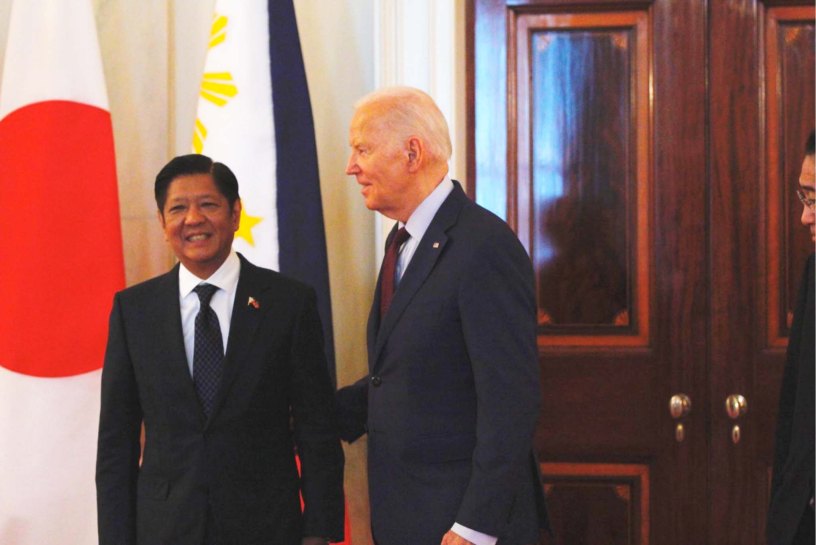US President Joe Biden (right) and Philippine President Ferdinand Marcos Jr. (left) at the White House on April 11, 2024.
WASHINGTON — US President Joe Biden has again guaranteed that any attack on a Philippine aircraft, vessel, or armed forces in the South China Sea will invoke the Mutual Defense Treaty (MDT).
Biden made it clear in his opening speech at the summit with Philippine President Ferdinand Marcos Jr. and Japanese Prime Minister Kishida Fumio here on Thursday afternoon that Washington’s defense commitments to the two Asian countries are “ironclad.”
The United States and the Philippines have had the MDT in place for more than
70 years. The MDT requires both nations to send support if a party is being attacked.
Biden’s forceful reinforcement of the American commitment comes in the midst of persistent skirmishes between the Philippine and Chinese coast guards in the disputed South China Sea.
“We’re deepening our maritime and security ties, this is something I know you discussed with Vice President Harris during her travel to the Indo-Pacific. And I want to be clear: the United States defense commitments to Japan and to the Philippines are ironclad, they are ironclad,” he said.
“As I said before, any attack on Philippine aircraft, vessels, or armed forces in the South China Sea will invoke our Mutual Defense Treaty,” he added.
According to the US leader, increasing security ties between the US, Japan, and the Philippines is crucial to maintaining a free, open, vibrant, and prosperous Indo-Pacific region.
“As you heard me say before, a great deal of history in our world will be written in the Indo-Pacific, over the coming years. And as the three allies, three partners, three proud democracies representing half-a-billion people, today we commit to writing that story and our future together,” Biden said.
“To build an Indo-Pacific that is free, open, prosperous, and secure for all, this afternoon, we’ll discuss a few key areas where our nations are deepening ties.”
“First, technology and clean energy, for securing our semiconductor supply chain to expanding trusted telecommunications in the Philippines, to building a clean energy workforce, to expanding our cooperation across the entire board,” he added.
The trilateral summit is the first-ever meeting between the three countries. It also comes in the midst of an increased tension in the South China Sea with Beijing’s demonstration of hostile behavior and Philippine officials complaining about China’s intrusive actions in the West Philippine Sea.
Chinese Coast Guard (CCG) ships also regularly approach disputed Japanese-controlled East China Sea islands near Taiwan.
The Philippine Coast Guard (PCG) has been protesting CCG’s harassment of Filipino vessels assisting military resupply missions to troops stationed at the grounded BRP Sierra Madre in Ayungin Shoal, otherwise known as Second Thomas Shoal.
BRP Sierra Madre is a Philippine Navy ship that was deliberately moored on the shoal in 1999 to assert Philippine sovereignty over the area.
China’s so-called “gray-zone” harassment has included shining military-grade lasers at PCG, firing water cannons at vessels, and ramming into Philippine ships near Ayungin Shoal, which both Manila and Beijing claim.
China has insisted on owning Ayungin Shoal despite the area being within the Philippine exclusive economic zone. Chinese officials also said that a former president promised to remove BRP Sierra Madre from Ayungin, but President Marcos said he is not aware of such a deal.
Biden, in a wide-ranging phone call with Chinese President Xi Jinping last week, raised concerns about China’s operations in the South China Sea, including efforts to impede the Philippines from resupplying its forces on Ayungin Shoal.
Chinese officials have bristled at criticism over their action in the South China Sea and blamed the United States for exacerbating tensions.
“No one should violate China’s territorial sovereignty and maritime rights and interests, and China remains steadfast in safeguarding our lawful rights,” Chinese Foreign Ministry spokeswomanMao Ning said Thursday.
The White House billed the first-ever trilateral summit with Japan and the Philippines as a potent response to China’s attempts at “intimidation” and said it should send a message that China is “the outlier in the neighborhood,” according to an administration official.
The White House said in a statement that Biden and Marcos during the talks “underscored their commitment to international law in the South China Sea” and reaffirmed their countries’ treaty obligations to defend each other.

